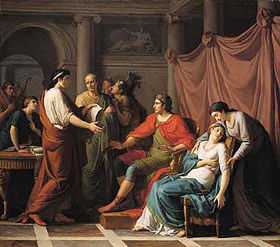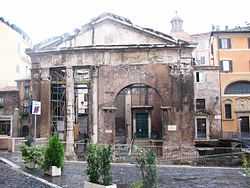Octavia the Younger
| Octavia Minor | |
|---|---|
 | |
| Spouse | Gaius Claudius Marcellus Minor Mark Antony |
| Issue | |
| Marcus Claudius Marcellus Claudia Marcella Major Claudia Marcella Minor Antonia Major Antonia Minor | |
| Father | Gaius Octavius |
| Mother | Atia Balba Caesonia |
| Born | 69 BC Nola, Roman Republic |
| Died | 11 BC Rome, Roman Empire |
| Burial | Mausoleum of Augustus |
Octavia the Younger (69 BC – 11 BC), also known as Octavia Minor or simply Octavia, was the sister of the first Roman Emperor, Augustus (known also as Octavian), half-sister of Octavia the Elder, and fourth wife of Mark Antony. She was also the great-grandmother of the Emperor Caligula and Empress Agrippina the Younger, maternal grandmother of the Emperor Claudius, and paternal great-grandmother and maternal great-great grandmother of the Emperor Nero.
One of the most prominent women in Roman history, Octavia was respected and admired by contemporaries for her loyalty, nobility and humanity, and for maintaining traditional Roman feminine virtues.
Life
Childhood
Full sister to Augustus, Octavia was the only daughter born of Gaius Octavius' second marriage to Atia Balba Caesonia, niece of Julius Caesar.[1] Octavia was born in Nola, Italy; her father, a Roman governor and senator, died in 59 BC from natural causes. Her mother later remarried, to the consul Lucius Marcius Philippus. Octavia spent much of her childhood travelling with her parents.
First marriage
Before 54 BC her stepfather arranged for her to marry Gaius Claudius Marcellus Minor. Marcellus was a man of consular rank, a man who was considered worthy of her and was consul in 50 BC. He was also a member of the influential Claudian family and descended from Marcus Claudius Marcellus, a famous general in the Second Punic War. In 54 BC, her great uncle Caesar is said to have been anxious for her to divorce her husband so that she could marry Pompey who had just lost his wife Julia (Julius Caesar's daughter, and thus Octavia's cousin once removed). However, Pompey declined the proposal[2] and married Cornelia Metella instead. So Octavia's husband continued to oppose Julius Caesar including in the crucial year of his consulship 50 BC.
Marcellus, a friend of Cicero, was an initial opponent of Julius Caesar when Caesar invaded Italy, but did not take up arms against his wife's great uncle at the Battle of Pharsalus, and was eventually pardoned by him. In 47 BC he was able to intercede with Caesar for his cousin and namesake, also a former consul, then living in exile. Presumably, Octavia continued to live with her husband from the time of their marriage (she would have been about 15 when they married) to her husband's death when she was about 29. They had three children: Claudia Marcella Major, Claudia Marcella Minor and Marcus Claudius Marcellus.[3] All three were born in Italy. Her husband Marcellus died in May 40 BC.
Second marriage

By a Senatorial decree, Octavia married Mark Antony in October 40 BC, as his fourth wife (his third wife Fulvia having died shortly before). This marriage had to be approved by the Senate, as she was pregnant with her first husband's child, and was a politically motivated attempt to cement the uneasy alliance between her brother Octavian and Mark Antony; however, Octavia does appear to have been a loyal and faithful wife to Antony.[4] Between 40 and 36 BC, she travelled with Antony to various provinces and lived with him in his Athenian mansion.[5] There she raised her children by Marcellus as well as Antony's two sons; the two daughters of her marriage to Antony, Antonia Major and Antonia Minor, were born there.
Breakdown
The alliance was severely tested by Antony's abandonment of Octavia and their children in favor of his former lover Queen Cleopatra VII of Egypt (Antony and Cleopatra had met in 41 BC, an interaction that resulted in Cleopatra bearing twins, a boy and a girl). After 36 BC, Octavia returned to Rome with the daughters of her second marriage. On several occasions she acted as a political adviser and negotiator between her husband and brother.[6] Mark Antony divorced Octavia in 32 BC,[7] after she had supplied him with men and troops, in 35 BC, to be used in his eastern campaigns.[8] Following Antony's rejection of her, their divorce, and his eventual suicide in 30 BC, Octavia became sole caretaker of their children[9] as well as guardian of Antony's children from his unions with both Fulvia and Cleopatra:
- Iullus Antonius (Fulvia),
- Alexander Helios (Cleopatra),
- Cleopatra Selene II (Cleopatra),
- Ptolemy Philadelphus (Cleopatra)
Octavia did not marry a third time.
Life after Antony

Augustus adored, but never adopted, her son Marcellus (Plut. Ant. is mistaken). When Marcellus died of illness in 23 BC unexpectedly, Augustus was thunderstruck, Octavia disconsolate almost beyond recovery. The major source that Octavia never recovered is Seneca (Cons. ad Marciam), but Seneca may wish to show rhetorical hyperbole, not repeat a fact. Some facts dispute Seneca's version, for Octavia publicly opened the Library of Marcellus, dedicated in his memory, while her brother completed Marcellus's theatre in his honor. Undoubtedly Octavia attended both ceremonies.
Aelius Donatus, in his Life of Vergil, states that Virgil
recited three whole books [of his Aeneid] for Augustus: the second, fourth, and sixth--this last out of his well-known affection for Octavia, who (being present at the recitation) is said to have fainted at the lines about her son, "… You shall be Marcellus" [Aen. 6.884]. Revived only with difficulty, she sent Vergil ten-thousand sesterces for each of the verses."[10]
She never fully recovered from the death of her son and retired from public life, except on occasions. She appears to have attended the Ara Pacis ceremony to welcome her brother's return in 13 from the provinces. She was also consulted in regard to, and in some versions advised, that Julia marry Agrippa after her mourning for Marcellus ended. Agrippa had to divorce Octavia's daughter Claudia Marcella (Major) in order to marry Julia, so Augustus wanted Octavia's endorsement very much.
Death

Octavia died between 11 and 9 BC of natural causes. Her funeral was a public one, with her sons-in-law carrying her to the grave in the Mausoleum of Augustus. Augustus delivered the funeral oration and gave her the highest posthumous honors (e.g. building the Gate of Octavia and Porticus Octaviae in her memory). Augustus declined some other honors decreed to her by the senate, for reasons unknown.[11] She was one of the first Roman women to have coins minted in her image; probably only Antony's previous wife Fulvia pre-empted her.
Issue
- Children with Marcellus
Octavia and her first husband had one son and two daughters born late in their marriage:
- Marcellus
- Claudia Marcella Major
- Claudia Marcella Minor
- Children with Mark Antony
Octavia and Mark Antony had two daughters by their marriage (her second, his fourth), and both were the ancestors of later Roman Emperors.
- Antonia Major: grandmother to Emperor Nero.
- Antonia Minor: mother to Emperor Claudius, grandmother to Emperor Caligula, and great-grandmother to Emperor Nero.
Ancestry
| 8. Gaius Octavius | ||||||||||||||||
| 4. Gaius Octavius | ||||||||||||||||
| 2. Gaius Octavius | ||||||||||||||||
| 1. Octavia the Younger | ||||||||||||||||
| 12. Marcus Atius Balbus | ||||||||||||||||
| 6. Marcus Atius | ||||||||||||||||
| 26. Sextus Pompeius | ||||||||||||||||
| 13. Pompeia | ||||||||||||||||
| 27. Lucilia | ||||||||||||||||
| 3. Atia Balba Caesonia | ||||||||||||||||
| 28. Gaius Julius Caesar II | ||||||||||||||||
| 14. Gaius Julius Caesar III | ||||||||||||||||
| 29. Marcia | ||||||||||||||||
| 7. Julia Caesaris | ||||||||||||||||
| 30. Lucius Aurelius Cotta | ||||||||||||||||
| 15. Aurelia Cotta | ||||||||||||||||
| 31. Rutilia | ||||||||||||||||
(See also Julio-Claudian family tree)
Fictional representations
A highly fictionalized version of Octavia's early life is depicted in the 2005 television series Rome, in which Octavia of the Julii (Kerry Condon) commits incest with her brother, has a lesbian affair with Servilia of the Junii (the series' version of Servilia Caepionis) and a romantic relationship with Marcus Agrippa (based on the historical Marcus Vipsanius Agrippa).
Octavia's later life, around the time of the death of Marcellus, is depicted in the 1976 television adaptation of Robert Graves's novel I, Claudius. The role was played by Angela Morant, and should not be confused with Claudia Octavia (also referred to as "Octavia" in the series), Claudius' daughter and wife of the future emperor Nero, who was played by Cheryl Johnson.
Notes
- ↑ Suetonius, Augustus 4.1
- ↑ Suetonius, Caesar 27.1
- ↑ Suetonius, Augustus 63.1; Plutarch, Antony 87
- ↑ Plutarch, Antony 31; Appian, Civil Wars 5.64 and 5.66; Cassius Dio, Roman History 48.31.3
- ↑ Plutarch, Antony 33; Appian, Civil Wars 5.76
- ↑ So at the treaty of Taranto in 37 BC: Plutarch, Antony 35; Appian, Civil Wars 5.93-95; Cassius Dio, Roman History 48.54
- ↑ Plutarch, Antony 57.4-5; Cassius Dio, Roman History 50.3.2
- ↑ Plutarch, Antony 53; Cassius Dio, Roman History 49.33.3-4
- ↑ Plutarch, Antony 87; Cassius Dio, Roman History 51.15.5
- ↑ Life of Virgil
- ↑ Cassius Dio, Roman History 54.35.4-5
Further reading
- Life and virtues
- Details on Octavia pt 1 "Octavian was much attached to his sister, and she possessed all the charms, accomplishments and virtues likely to fascinate the affections and secure a lasting influence over the mind of a husband. Her beauty was universally allowed to be superior to that of Cleopatra and her virtue was such as to excite even admiration in an age of growing licentiousness and corruption."
- Details on Octavia pt 2
- Nuttall Encyclopedia profile says merely that she was "distinguished for her beauty and her virtue"
- Discussion
| Wikimedia Commons has media related to Octavia Minor. |
- Family and descendants
External links
| Wikisource has the text of the 1911 Encyclopædia Britannica article Octavia. |
- Octavia entry in historical sourcebook by Mahlon H. Smith
- Livius.org: Octavia Minor